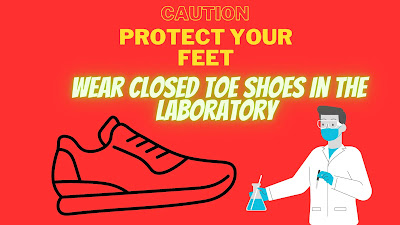
Introduction: Acknowledging the Perils
When working in a laboratory, one must take note of the hazardous materials present & the experiments being conducted, both of which can trigger incidents such as chemical spills, fires, and explosions. Exposure to noxious materials or injury from broken glass or sharp objects can result in severe health complications like burns, lacerations, contusions, and infections.

The Significance of Closed-Toe Shoes
When one steps into a laboratory, it is essential to don a pair of closed-toe shoes, as this protective gear creates a barrier between one’s feet and the environment, hindering exposure to hazardous materials, such as dangerous chemicals, broken glass, and other perilous items. Wearing closed-toe shoes also lessens the risk of slips, trips, and falls, as the shoes’ slip-resistant soles grant better grip & support.

Common Foot Injuries in the Lab
Inappropriate footwear in a laboratory setting, such as sandals or open-toe shoes, could lead to various types of foot injuries. For example, chemical spills could lead to burns & corrosion on the skin & tissues of the feet, while sharp objects & broken glass could pierce the skin, resulting in cuts & puncture wounds. Heavy items could also accidentally fall on one’s toes, causing fractures & other forms of trauma.

Selecting the Proper Closed-Toe Shoes
In choosing the perfect pair of closed-toe shoes, one must prioritize comfort, durability, and adequate protection. The shoes must fit snugly & come with soles that prevent slips & falls. Moreover, they must be made of materials that resist chemicals, such as neoprene, rubber, or polyurethane.

Proper Maintenance and Care
To ensure that your closed-toe shoes provide optimal protection, it is important to maintain & care for them properly. It is recommended that you conduct regular inspections to check for any signs of wear & tear, including cracks, holes, or loose soles. If you notice any damage, it is important to replace the shoes immediately to avoid compromising their protective capabilities. Furthermore, it is crucial to clean your shoes regularly to remove any hazardous substances that may have accumulated on them. substances that may have accumulated on them.

Conformity with Safety Regulations
Regulatory agencies such as the EPA & OSHA establish safety regulations that laboratories must abide by. These rules make it mandatory for workers to use suitable personal protective equipment (PPE), including closed-toe shoes, to safeguard against laboratory hazards. Failing to adhere to these regulations may result in severe consequences such as penalties, legal action, and fines.

Conclusion: Play it Safe
Working in a laboratory can be both fulfilling & challenging, but safety should always be the number one priority. Although donning closed-toe shoes may appear to be a minor detail, it can make a significant difference in reducing injuries & exposure to hazardous materials. By taking the necessary precautions & complying with safety regulations, one can reduce the risk of accidents & create a safer & healthier workplace environment.

In short, wearing closed-toe shoes in a laboratory is a must-wear to protect your feet from hazards & to minimize the risk of injury & exposure to hazardous materials. Choosing the right closed-toe shoes, properly maintaining them, and complying with safety regulations are all essential steps to ensure a safer & healthier workplace. So, don’t risk it – wear closed-toe shoes in the lab!
-min.webp)
FAQs

Q1. Why can’t I wear open-toe shoes in the lab?
A: Open-toe shoes leave the feet exposed to hazardous materials and sharp objects, increasing the risk of injury and exposure.

Q2. What types of closed-toe shoes are best for the lab?
A: Closed-toe shoes made of rubber, neoprene, or polyurethane are the best choices for the lab as they are durable and resistant to chemicals.

Q3. Can I wear sneakers or running shoes in the lab?
A: While sneakers or running shoes may provide some protection, they may not be appropriate for the lab as they may not be slip-resistant or made of materials that are resistant to chemicals.

Q4. What should I do if I get a chemical spill on my closed-toe shoes?
A: If you get a chemical spill on your shoes, you should immediately remove them and rinse your feet with water for at least 15 minutes. Seek medical attention if necessary.
Q5. Can I wear sandals or flip-flops in the lab if I’m not working with hazardous materials?
A: No, open-toe shoes of any kind are not appropriate for the lab as accidents can happen at any time, and it’s always better to be safe than sorry.

